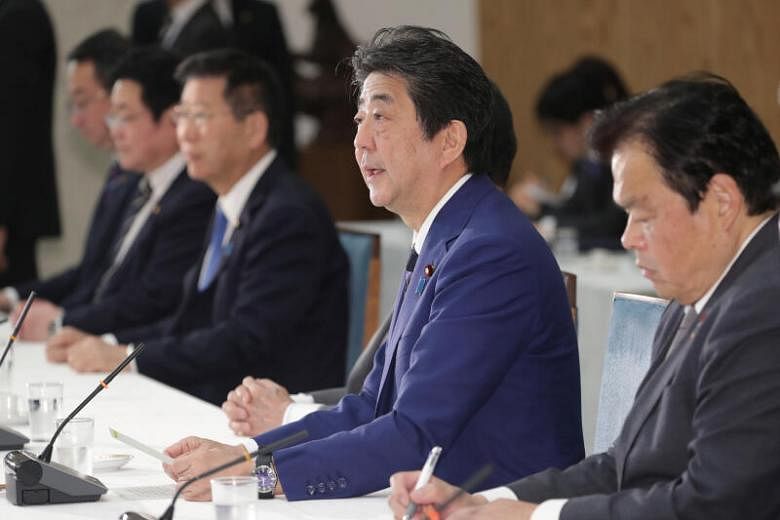TOKYO - The Japanese Cabinet approved draft "state of emergency" measures on Tuesday (March 10) that will give prefecture authorities the right to impose curfews, close schools, call off events and take over private facilities for medical care.
The Bill is set to coast through the Diet, as Japan's Parliament is known, by this week despite some reservations among the opposition that it vests too much power in Prime Minister Shinzo Abe's Cabinet to make decisions without parliamentary approval.
"Given that individual rights would be suppressed after an emergency declaration, I would thoroughly examine its potential impact when making any decision," Mr Abe said on Monday.
This comes as Mr Abe has been criticised for being absent and indifferent in the initial phase of the outbreak, as reflected in waning Cabinet support in numerous media polls. A government panel of experts has also warned that Japan's fight against the coronavirus could last until the end of this year.
The prime minister is now putting himself front and centre of Japan's response, with the fate of the Tokyo Olympic Games, which are due to open on July 24, on the line. Estimates show that cancelling the marquee sporting event will shave 1.4 per cent off the gross domestic product, with the economy already on the brink of a recession.
But, in doing so, Mr Abe is seen as overcompensating by imposing measures that have taken his own expert panel by surprise, and even incurred backlash from some parts of society.
The measures included an appeal for national school closures this month, and just this week, entry restrictions on travellers from China and South Korea despite both countries reporting a sharp slowdown in infection numbers.
"Abe may be trying to demonstrate to both domestic and overseas audiences that he is ready to exercise strong leadership and take drastic action, if necessary," the Asahi daily said in an editorial last Saturday, as it noted a series of "political (decisions) not based on solid science".
As it is, there has been mistrust over whether Japan's reported infection numbers actually reflect the situation on the ground.
The expert panel said they saw no evidence of cases mounting "explosively", but suspicions are rife that the more than 500 confirmed cases of Covid-19 could just be the tip of the iceberg, given Japan's limited testing capacity and strict screening criteria. Some patients have been denied tests even with a doctor's recommendation.
"While governments like Singapore went into full gear when cases of domestic transmission occurred, in Japan there was an inertia and inability to grasp the possibility of an outbreak," Sophia University political scientist Koichi Nakano told The Straits Times.
"Abe might now be hoping to shift perceptions, that he is now reinvigorated and taking charge," Mr Nakano added, although he said he did not believe Mr Abe will declare a state of emergency, as this will not bode well for the Olympics' chances.
Mr Abe said this week that the government plans to designate the coronavirus outbreak as a "historic emergency situation" in an administrative measure that requires proper management of public records.
The Health Ministry also urged municipal governments on Monday to prepare for the unlikely "worst case scenarios" such as an influx of patients infected with the coronavirus, were the outbreak to worsen.
Its own estimates make for grim reading. Tokyo is forecast to have 45,400 outpatients and 20,500 inpatients daily, with 700 in serious condition. Hokkaido, meanwhile, is predicted to see 18,300 outpatients and 10,200 inpatients, with 340 critically ill.
"Checking whether people are infected with the new coronavirus is fundamental to preventing the spread of viral infection and treating patients," an editorial in the Yomiuri daily said on Sunday. "Testing capabilities must be strengthened to prepare for an increase in the number of patients."
Meanwhile, Japan on Tuesday approved a 1.1 trillion yen (S$14.6 billion) war chest of support measures for small-and-medium enterprises and self-employed workers hurt by the outbreak, as well as for working parents affected by school closures.
This comes on top of another tranche of measures worth 500 billion yen last month.
Separately, Japan will criminalise the reselling of protective masks for profit from next Sunday, with penalties of up to one year in jail or a one million yen fine, or both.
Mr Hiroyuki Morota, 53, a politician in Shizuoka prefecture apologised on Monday for having earned 8.9 million yen from the resale of face masks on auction sites.












